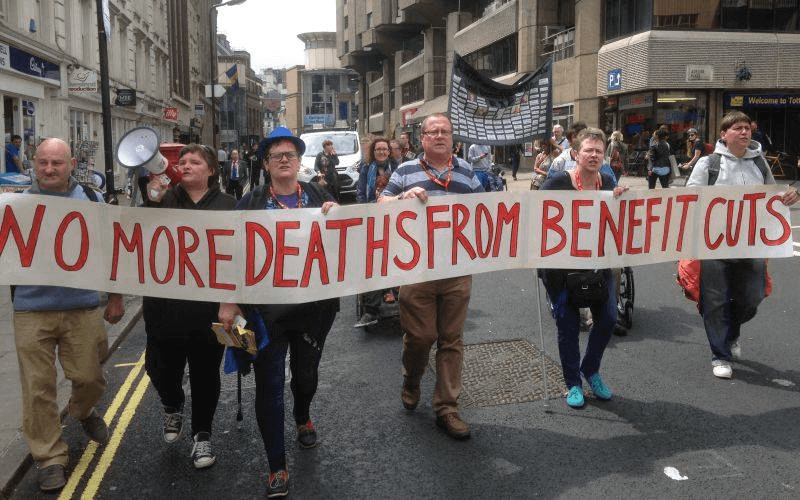The equality watchdog has been accused of bowing to political pressure by failing to force the Department for Work and Pensions (DWP) to prevent further deaths of disabled benefit claimants, two years after promising to take legal action.
It is now more than two years since the Equality and Human Rights Commission (EHRC) announced it was drawing up a legally-binding “section 23 agreement” with DWP that would force it to act.
But every time EHRC has been challenged about its failure to act in the last two years, it has said it is legally prevented from commenting on any discussions it is having with DWP.
EHRC said in April 2022 that it expected DWP to sign a section 23 agreement by the summer of 2022.
The agreement, EHRC said at the time, would commit DWP “to an action plan to meet the needs of customers with mental health impairments and learning disabilities” and it said it had concluded that action was necessary “given the seriousness of the issues”.
The commission only announced that plan after failing to follow through on proposals for an inquiry into the deaths of countless disabled people that had been linked to DWP’s actions.
But this week, more than two years on, disabled people and allies have spoken of their anger and frustration at the commission’s continuing refusal to follow through on its promise of legal action.
Mark Harrison, a member of the steering group of the Reclaiming Our Futures Alliance (ROFA), said: “In the two years the EHRC has failed to sign the section 23 agreement, many more unnecessary benefit-related deaths have occurred and many more disabled people have been harmed psychologically by the DWP and their repressive policies.
“ROFA has been raising this issue with the EHRC over the last 18 months as we know this government has no intention of signing this agreement.
“The truth is the EHRC has failed to protect the human rights of disabled claimants.”
He added: “Unfortunately, the leadership of the EHRC, appointed by the Tory government, are political stooges who are preventing holding this administration to account.”
Debbie Abrahams, Labour MP for Oldham East and Saddleworth, who for years has led parliamentary efforts to hold DWP to account over the deaths, said EHRC’s actions showed that it “has no teeth” and she said it was “staggering” that “absolutely nothing has changed”, two years after the commission’s section 23 statement.
She pointed to last month’s report by the UN committee on the rights of disabled people, which found the UK government had made “no significant progress” since being found guilty in late 2016 of “grave and systematic” violations of the UN disability convention.
She said that, if anything, the discrimination was “getting worse”, and she pointed to the “scapegoating of sick and disabled people” by the prime minister in his “sick note culture” speech last month.
Disabled campaigner Alison Burton, whose father-in-law Errol Graham starved to death after DWP wrongly stopped his benefits when he missed a work capability assessment, told Disability News Service she was “seriously disappointed” at the commission’s failure to act.
She said: “I am disappointed that the EHRC has not exercised its powers to its full capacity.
“They have let down an awful lot of vulnerable and disabled people who look on the EHRC to uphold their rights and protect them.
“I feel that they have failed them.”
Carolin Ott, a solicitor with Leigh Day, which represents Errol Graham’s family, said Burton was “disappointed and concerned” that nearly six years after his death and two years after EHRC’s section 23 announcement “little has been done to ensure that what happened to Errol does not happen again and the agreement has yet to be signed”.
She pointed to last month’s report by the UN committee, which said the committee was “appalled” by reports of “benefit deaths” in the UK.
The committee said the deaths linked to benefit claims had a “disturbingly consistent theme”, with disabled people “resorting to suicide” following the denial of adequate support through social security.
It called for the government to take urgent action to “prevent, review and respond to” benefit-related deaths and provide appropriate compensation for the victims’ families.
And it concluded that the government had made “no significant progress” since 2016.
Ott said: “This begs the question: how many more people have to die before the relevant bodies take responsibility to effect meaningful change?”
An EHRC spokesperson said: “Due to legal restrictions set out in section six of the Equality Act 2006, the EHRC is unable to disclose further information about our ongoing discussions with the DWP.”
DWP refused to comment but claimed that it was continuing to work with EHRC over its concerns.
A note from the editor:
Please consider making a voluntary financial contribution to support the work of DNS and allow it to continue producing independent, carefully-researched news stories that focus on the lives and rights of disabled people and their user-led organisations.
Please do not contribute if you cannot afford to do so, and please note that DNS is not a charity. It is run and owned by disabled journalist John Pring and has been from its launch in April 2009.
Thank you for anything you can do to support the work of DNS…

 Minister finally admits that working-age benefits spending is stable, despite months of ‘spiralling’ claims
Minister finally admits that working-age benefits spending is stable, despite months of ‘spiralling’ claims Timms says cuts must go ahead, despite being reminded of risk that disabled claimants could die
Timms says cuts must go ahead, despite being reminded of risk that disabled claimants could die Timms misleads MPs on DWP transparency and cover-ups, as he gives evidence on PIP review
Timms misleads MPs on DWP transparency and cover-ups, as he gives evidence on PIP review